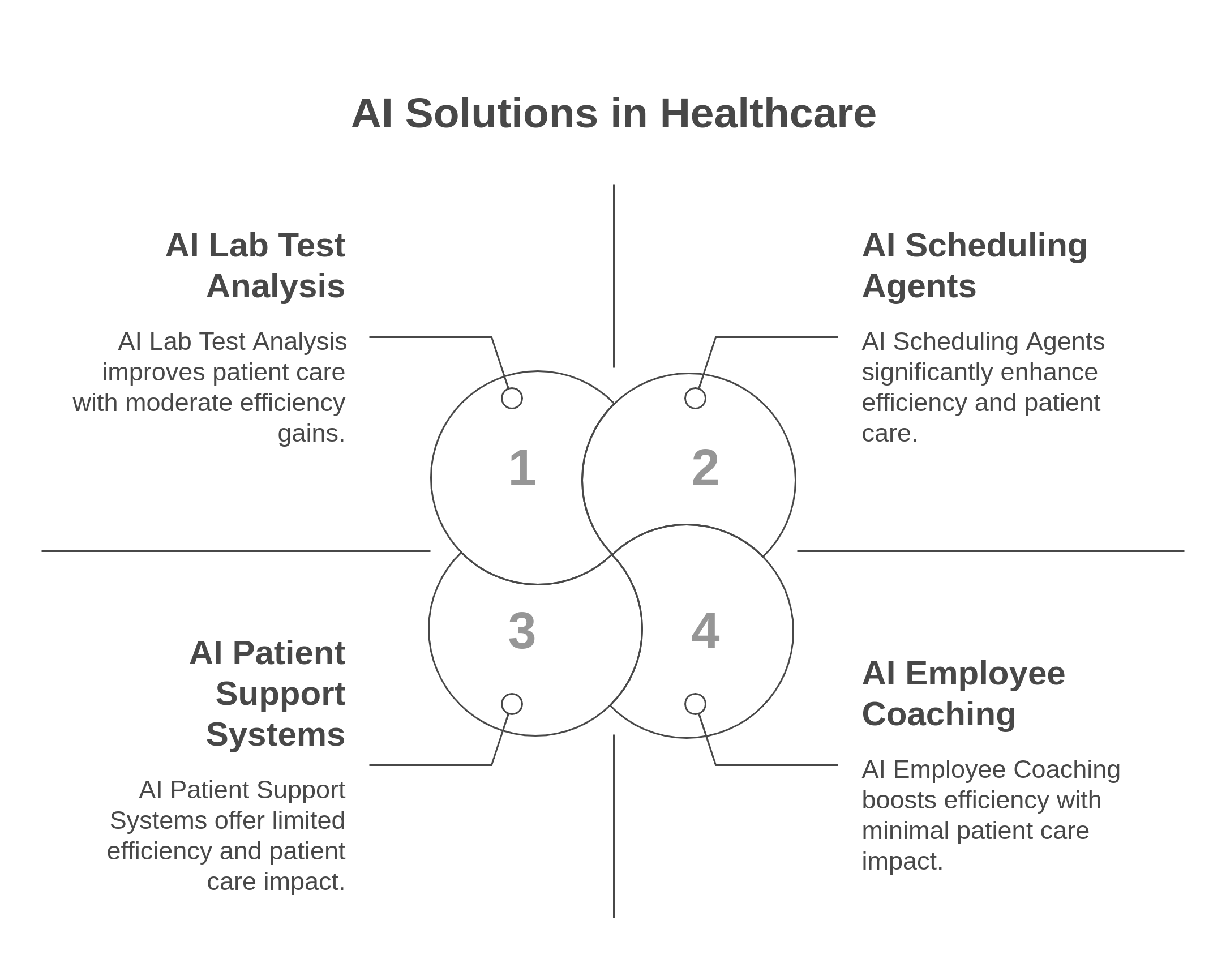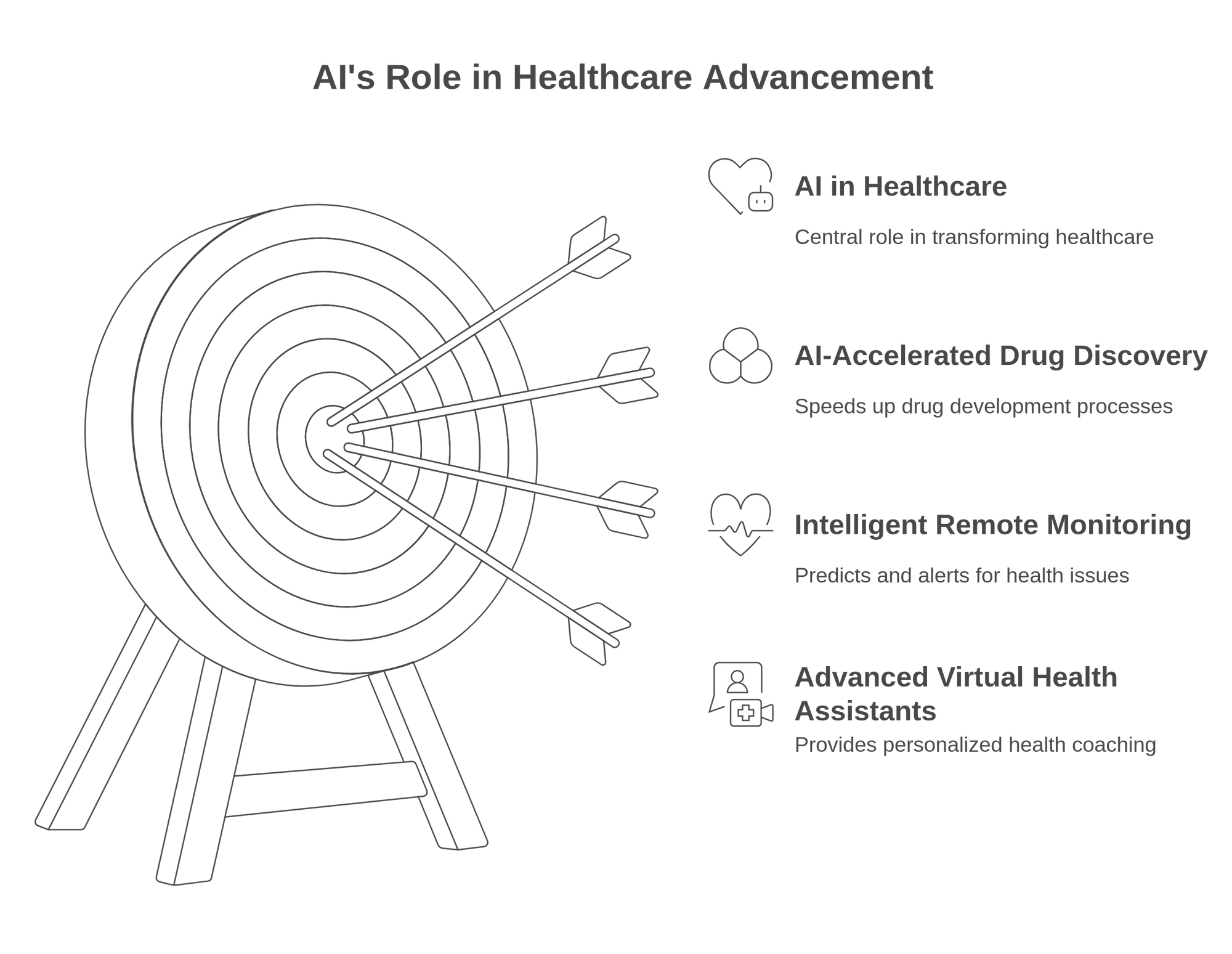
Artificial Intelligence (AI) redefines the healthcare industry, driving efficiency in medical diagnostics, patient management, and administrative workflows. AI-powered agents are at the forefront of this transformation, enabling hospitals, clinics, and healthcare providers to automate repetitive tasks, enhance patient care, and improve decision-making.
Table of Contents
By 2030, the global AI in the healthcare market is projected to surpass $164.16 billion, fueled by increasing demand for intelligent automation in medical institutions (Markets and Markets). AI-driven automation is already making a significant impact, with studies showing that AI can reduce hospital operational costs by up to 30% while improving patient outcomes (Express Healthcare).
This article explores AI agent use cases in healthcare, their underlying architecture, industry insights, and their long-term benefits in transforming patient care.
What is an AI Agent?

AI agents in healthcare are intelligent, autonomous systems that perform specific medical and administrative functions. These agents leverage machine learning (ML), natural language processing (NLP), and robotic process automation (RPA) to assist healthcare professionals, reducing workload and improving efficiency.
Automate repetitive administrative tasks, such as appointment scheduling and medical record management.
Assist in diagnostics, helping doctors analyze medical images, pathology reports, and genetic data.
Provide virtual healthcare assistance, handling patient queries, symptom analysis, and remote consultations.
Monitor patient health using wearable devices and AI-driven analytics for predictive health assessments.
Unlike conventional software that follows rigid, pre-programmed instructions, AI agents demonstrate remarkable adaptability. They learn from each interaction, continuously refining their capabilities to provide increasingly personalized and effective healthcare solutions. This adaptive intelligence allows them to function with growing independence, requiring less human oversight while delivering more nuanced support.
Insights into AI Agents and the Healthcare Industry
AI agents are reshaping the roles of healthcare professionals by handling administrative burdens and improving data-driven decision-making. According to the American Hospital Association (2023), AI-driven automation can
Nearly two-thirds (64%) of clinicians in South America believe AI will benefit the majority of their decisions. [Source]
Shorten diagnostic turnaround times, with AI-assisted radiology reducing scan analysis time by 60%.
Between 2020 and 2023, the market size of AI in healthcare grew by 233%, from $6.7 billion to $22.4 billion.[Source]
Challenges in AI Adoption in Healthcare
Despite compelling benefits, healthcare organizations face significant challenges when adopting AI technologies:
Data Privacy & Security: AI systems require access to sensitive patient information to function effectively, raising critical questions about data protection. Healthcare organizations must implement robust security frameworks that safeguard patient confidentiality while enabling AI functionality.
Regulatory Compliance: Healthcare AI solutions must navigate a complex regulatory landscape, including HIPAA compliance in the United States, GDPR requirements in Europe, and various national healthcare data regulations worldwide. This regulatory complexity necessitates careful implementation planning and ongoing compliance monitoring.
Integration Complexity: Many healthcare institutions operate on legacy infrastructure that wasn't designed for AI integration. Successful implementation often requires significant investment in systems modernization and careful architecture planning to enable seamless data flow between existing platforms and new AI capabilities.
Leading Industry Player in AI Healthcare
Key organizations leading AI adoption in healthcare include
IBM Watson Health: Uses AI to assist in cancer diagnostics and medical research.
Google DeepMind: Developing AI-powered tools for retinal disease detection and predictive analytics.
Mayo Clinic & Cleveland Clinic: Pioneering AI-driven diagnostics, virtual patient monitoring, and administrative automation.
Different Types of AI Agent Cases in Healthcare

1. Intelligent Appointment Scheduling
Challenge: Healthcare providers struggle with scheduling inefficiencies that create cascading problems: overbooked providers, understaffed time slots, excessive patient wait times, and costly no-shows that waste valuable clinical resources.
Solution: AI-powered scheduling agents deliver comprehensive scheduling intelligence by:
Automatically managing appointment booking, confirmation, and rescheduling.
Sending personalized reminders through multiple channels (SMS, email, chat).
Optimizing provider schedules based on patient acuity, provider specialization, and historical patterns.
Predicting no-show probability and overbooking accordingly.
Impact: Organizations implementing AI scheduling report impressive results, including reduced appointment no-shows and approximately 20 hours of administrative time saved weekly per front desk staff member.
2. Lab Test Analysis and Risk Assessment
Challenge: Traditional lab report review processes are labor-intensive and prone to human error, creating the potential for missed abnormalities or delayed interventions.
Solution: AI analysis agents transform this process by:
Automatically scanning results to flag abnormal values and concerning patterns.
Cross-referencing current results with patient history to identify significant changes.
Calculating personalized risk scores based on comprehensive medical profiles.
Recommending appropriate follow-up tests or specialist referrals.
Impact: Healthcare facilities employing these systems have a reduction in diagnostic errors and faster test result processing, allowing earlier intervention for critical conditions.
Discover how AI agents can change your healthcare operations!
Contact our AI specialist today and learn how AI can help you grow your business.

3. Healthcare Employee Coaching and Development
Challenge: Maintaining consistent training and performance improvement across large healthcare teams presents significant management challenges.
Solution: AI coaching agents provide personalized professional development by:
Analyzing individual performance metrics and patient feedback.
Delivering customized training content addressing specific knowledge gaps.
Identifying behavioral patterns that may indicate burnout or other concerns.
Providing real-time guidance during complex procedures or interactions.
Impact: Organizations implementing AI coaching solutions improve employee productivity metrics and reduce workplace errors, enhancing both operational efficiency and patient safety.
4. Intelligent Patient Support Systems
Challenge: Modern healthcare facilities face overwhelming patient communication volume that exceeds staff capacity, resulting in long response times and patient dissatisfaction.
Solution: AI-powered support agents transform patient communication by:
Providing immediate responses to common questions about medications, procedures, and facility information.
Escalating complex issues to the appropriate human staff with complete context.
Offering multilingual support to serve diverse patient populations.
Delivering personalized health information based on patient records.
Impact: Hospitals implementing these systems reduce routine support workload and improve patient satisfaction scores, demonstrating how automation can enhance rather than diminish the patient experience.
5. Medical Transport and Asset Management
Challenge: Efficient management of ambulances and medical transport resources is critical for emergency response effectiveness.
Solution: AI fleet management agents optimize medical transport by:
Continuously monitoring vehicle health metrics to predict maintenance needs.
Analyzing historical usage patterns to optimize vehicle deployment.
Providing real-time routing recommendations based on traffic conditions.
Managing maintenance schedules to minimize vehicle downtime.
Impact: Emergency services are implementing these systems to reduce vehicle downtime and decrease maintenance costs, translating directly to improved response times and patient outcomes.
AI Agent Workflow in Healthcare

Benefits of AI Agents in Healthcare
AI agents offer a range of advantages, from improving patient care to optimizing hospital operations. Here’s a detailed breakdown:
Enhanced Patient Experience
AI-powered patient interaction systems are transforming the healthcare experience by eliminating traditional friction points:
Immediate appointment scheduling without hold times.
24/7 access to health information and support resources.
Personalized medication and appointment reminders.
Consistent communication across all touchpoints.
Harvard Health AI Study (2023) reports that healthcare organizations implementing these systems see 40% increases in patient engagement metrics and a 50% reduction in communication-related complaints.
Operational Excellence
AI automation delivers remarkable operational improvements across healthcare organizations:
25% reduction in administrative paperwork.
30% decrease in operational costs.
Significant improvement in claim accuracy and reimbursement timelines.
More efficient resource allocation through predictive analytics.
These efficiency gains allow healthcare organizations to redirect resources from administrative overhead to direct patient care improving both financial performance and care quality.
Diagnostic Precision
AI-enhanced diagnostic systems are demonstrating remarkable accuracy in critical areas:
Stanford AI Research (2023) reports 95% accuracy in AI-assisted cancer detection compared to 87% with traditional methods.
By augmenting human expertise with computational pattern recognition, these systems improve early detection rates for numerous conditions, potentially saving countless lives through earlier intervention.
Professional Satisfaction
Healthcare burnout represents a growing crisis, with significant numbers of physicians and nurses reporting emotional exhaustion and decreased job satisfaction. AI implementation directly addresses key burnout factors by:
Automating 50% of routine documentation and administrative tasks.
Providing intelligent triage to prioritize critical cases.
Offering real-time clinical decision support during complex cases.
Organizations implementing comprehensive AI solutions can reduce burnout indicators and increase direct patient care time metrics, improving staff retention and care quality.
Financial Optimization
Healthcare organizations face unprecedented financial pressures from multiple directions. AI implementation delivers compelling financial benefits:
Reduction in operational expenses.
Decrease in fraudulent claims through intelligent detection.
Significant reduction in readmission penalties through better risk prediction.
More efficient resource utilization through predictive scheduling.
These financial improvements help healthcare organizations maintain financial stability while continuing to invest in quality improvement initiatives.
The Future of AI in Healthcare

As AI technology continues its rapid evolution, healthcare applications will become increasingly sophisticated and integrated:
Advanced Virtual Health Assistants will provide increasingly personalized guidance, moving beyond simple question-answering to deliver comprehensive health coaching tailored to individual needs and preferences.
Intelligent Remote Monitoring will extend beyond basic vital signs tracking to provide predictive alerts for deteriorating conditions, allowing earlier intervention for high-risk patients.
AI-Accelerated Drug Discovery will dramatically reduce pharmaceutical development timelines by predicting molecular interactions and treatment efficacy with unprecedented accuracy.
With industry leaders, including IBM Watson Health, Google DeepMind, and major medical centers continuing to invest heavily in healthcare AI, we can expect accelerating innovation and adoption in coming years.
Ready to integrate AI agents into your healthcare system?
Contact our AI specialist today and learn how AI can help you grow your business.

Conclusion
Integrating AI agents into healthcare represents not just a technological evolution but a fundamental reimagining of how care is delivered. Organizations that embrace this transformation today will be best positioned to deliver superior patient outcomes, operational efficiency, and financial sustainability tomorrow.
By implementing AI solutions strategically, starting with high-impact applications like scheduling, diagnostics, and patient communication, healthcare providers can begin realizing immediate benefits while building the technical infrastructure and organizational capabilities needed for more advanced applications.
As we look toward a future where AI becomes increasingly embedded in healthcare delivery, one thing remains clear: the ultimate goal isn't technology for its own sake but rather leveraging these powerful tools to enhance the human elements of caregiving providers more time with patients, improving diagnostic accuracy, and creating more personalized therapeutic approaches.
If you want to integrate AI into your system, we can help you improve efficiency and bring a lot more than that with AI. Contact us today!
FAQs
What is the ROI timeline for implementing AI agents in healthcare?
Most healthcare organizations see measurable returns within 6-12 months. Administrative efficiencies come first, with clinical outcome improvements following in 12-18 months. Average three-year ROI ranges from 150-200%.
How do AI agents protect patient data and maintain HIPAA compliance?
Healthcare AI systems use encryption, access controls, and audit logging to protect data. Reputable vendors offer HIPAA-compliant solutions with business associate agreements and regular security testing to ensure patient information remains protected.
Can AI agents work with existing EHR systems?
Yes. Modern healthcare AI solutions integrate with major EHR platforms like Epic, Cerner, and Allscripts. Basic integration typically takes 3-6 months, while full workflow integration across departments may take 9-12 months.
Do doctors and nurses accept AI tools in their workflow?
Staff acceptance depends on implementation approach. Organizations that involve stakeholders early, provide proper training, and position AI as an assistant rather than replacement typically see 70-80% staff support after the initial adjustment period.
What should be our first step in implementing healthcare AI?
Start by identifying one high-impact, lower-complexity use case like appointment scheduling or patient communication. This approach demonstrates value quickly while you build necessary infrastructure. Focus on data readiness, stakeholder engagement, and clear success metrics.

